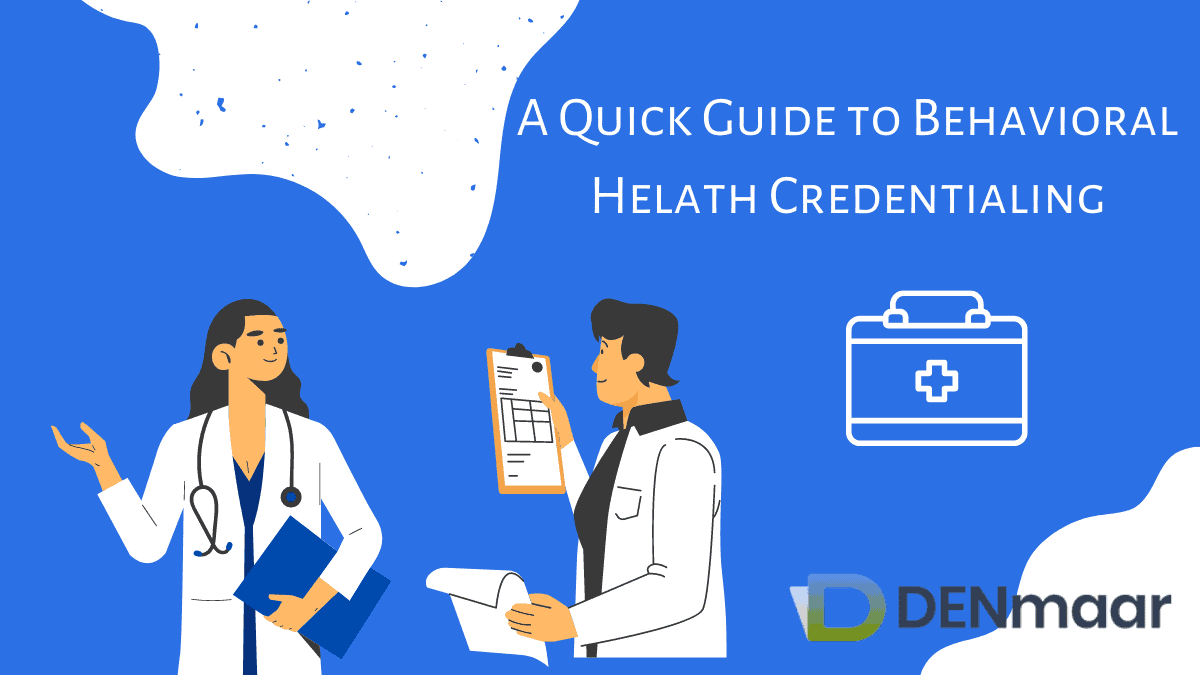
A Quick Guide to Behavioral Health Practitioner Credentialing
The following article will tell everything you need to know about successfully getting on an insurance panel as a mental health practitioner.
This goes without saying but getting on an insurance panel is no easy task and can be incredibly frustrating, especially for mental health practitioners with already a lot on their plate. One way to make the credentialing process less overwhelming would involve being aware of certain fundamentals related to the arduous but necessary task.
That is exactly what we at DENmaar aim to do with the help of the below guide. So, without much further ado, let’s get started.
Finding Reputable Insurance Panels
By now you must be aware of all the health insurance companies active in your city and state. From large brands like Cigna to national entities like Medicare, it would be wise to keep a note of all these names before you start the credentialing process.
We would recommend making a spreadsheet that includes all of these companies. Moreover, expand your search by contacting your professional network. If you aren’t sure how many insurance companies are active in your state, then doing a quick Google search will provide the answers you need.
Make sure you note down the contact and address info of each of the insurance companies you find online. Save this information on your spreadsheet. Learn about the conditions regarding provider credentialing that apply to each specific company and make a note of them as well.
Learn About the Requirements of Insurance Companies.
Insurance companies are constantly on the lookout for reliable practitioners for their panels. You must make a good case about your skills and strengths as a mental health practitioner in your application.
Below are a few things that insurance panels seek in their applicants.
1. Location
Insurance companies look favorably upon practitioners who are actively serving patients in an under-served location. Your chances of getting on an insurance panel skyrocket if you are operating a clinic or practice in an area where that isn’t adequately populated with healthcare providers like you offering their services.
2. Cultural Diversity
Do not forget to mention your ethnic background, especially if you belong to an atypical one. Also mention if you speak multiple languages. These defining characteristics will increase your chances of getting on an insurance panel.
3. Qualities and Specialty
Make sure to emphasize the training and educational qualifications you possess. Do not forget to mention your specialties, especially when you specialize in offering healthcare to kids, elders, and LGBT or minority members of society.
4. Crisis Therapy
Insurance Panels are likely to look favorably upon healthcare providers that respond to emergencies quickly.
The above factors make you stand-out, and as such, should be emphasized in your application to increase your chances of getting successfully credentialed. We recommend making a list of everything that makes you stand out among other mental health practitioners in your vicinity before undertaking the credentialing process.
Create a Good Resume and Letter of Intent
You need a good, comprehensive resume that highlights your skills and accomplishments. Follow the below pointers to create a compelling resume and letter of intent.
- • Make sure your resume is short. One page is more than enough
- • Focus on things that make you unique rather than mentioning things that anyone can do.
- • Always use short sentences
- • Form sentences in active voice
- • Do not misrepresent your skills or lie. Also, do not undersell yourself.
The following format will make for an ideal resume:
- • Contact information, License number with date of issue.
- • Statement of intent
- • Credentials, skills, specialties, educational qualifications
- • Mention job experience. Include references to the organizations you’ve worked with, in the past.
- • Include additional skills like the ability to speak multiple languages, etc.
The letter of intent is another thing you must be careful about when composing. You want to be distinguishable while portraying yourself in good light. The below format would make for an ideal letter of intent.
- • Clearly state the name of the insurance panel you want to be on.
- • Mention your credentials and educational qualifications
- • Explain what makes you stand out among your peers. This could be language, culture, availability, etc.
- • Mention if you have clients that are already on that panel and are being billed out of network.
- • Close your letter by letting your intentions and desire to join the panel crystal clear.
Finally, Apply to the Insurance Panels
Now that you are prepared, it’s finally time to submit your application.
- • Mail your resume along with the letter of intent to the appropriate application address.
- • Note down the date on which you applied.
- • Call the application office exactly one week after submission for confirmation. Note down the name of the representative that answered your call for follow-up and mention the date you called on.
- • Confirm the next steps and also ask when you can follow up next.
- • If for some reason your application is rejected. Do not be heartbroken and be ready to re-apply immediately.
Conclusion
Getting on an insurance panel is tough but not impossible. The above guide will considerably simplify the process for you. To make the process even more hassle-free, we recommend you give us at DENmaar a call. We are home to the credentialing experts and resources needed to help you get on an insurance panel effectively and efficiently.
You can explore our website or contact us now to learn more about how we can help with mental health insurance credentialing.
Related Posts
Nurse Practitioner Credentialing: Why is It Vital for Nurses and Healthcare Organizations?
Credentialing is usually considered to be a process only meant for physicians....
What is Medical Credentialing, and How it Works & Costs?
Medical credentialing is a complex concept to understand. So it is only natural...
A Quick Guide to Behavioral Health Practitioner Credentialing
The following article will tell everything you need to know about successfully...
5 Credentialing Issues in Healthcare & Their Resolutions
Credentialing issues in healthcare are extremely common. In fact, the process...



